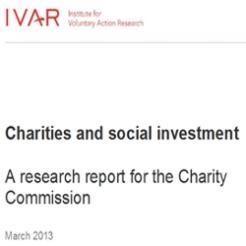A report written for the Charity Commission has found that those involved in social investment can have little awareness of the significance of charitable status, holding back the social investment market as a consequence.
Following a 2011 update to its guidance on Charities and Investment Matters, the sector regulator commissioned the Institute for Voluntary Action Research (Ivar) to analyse charities’ experiences with social investment and the regulatory issues that emerged.
Ivar has now released Charities and social investment: A research report from the Charity Commission. It focuses specifically on charities’ experiences of receiving and making social investments and collects views on how the market will develop over the next five years.
The report inclues interviews, meetings and group discussions with 70 organisations, broken down into 25 charities that have received social investment (chief officers and trustees); 25 which have made social investments (senior managers and trustees); and 20 intermediary, infrastructure and academic/think tanks.
Partners must be better informed
The Commission said that the major point which emerges from the findings is that intermediaries and partners involved in social investments with a charity need to be better informed of the significance of the organisation’s status.
Specifically, the charity should point out that if making a programme-related investment, trustees must ensure that the investment directly furthers the charity’s aims. Any private benefit arising from charitable investment must be carefully considered and assessed by trustees, plus charities cannot distribute profits and there are strict rules surrounding the payment of interest on share capital.
In a statement, the Commission wished to emphasise that despite the importance of highlighting the restrictions, trustees of investment charities might be surprised by the wide range of options available to them.
“But it is important to remember that the core characteristics of charitable status must not be overlooked when it comes to investment – social or otherwise,” the sector regulator said, adding that due attention to this would prevent organisations “from becoming involved in inappropriate investments”.
Trustess can seek external help
Social investment itself could be better understood by those involved as well, the report further found. “It is vital that trustees make every effort to get to grips with a particular investment before embarking on it – this includes seeking external help and expertise if they need to,” the Commission said.
The Commission emphasised that as regulator of charities in England and Wales, it neither encourages nor discourages charities to enter into the social investment market.
“Our focus instead is on ensuring that trustees are able to confidently make decisions about social investment in the best interests of their charities,” it said.
Social investment ‘should not replace grants’
Looking towards the future, study participants described social investment as at an “embryonic” stage of its development, and bemoaned a lack of sufficient track record to attract interest from most charities. Some interviewees felt it was too early to talk about social investment becoming an asset class of its own.
The report found that charity investees and investors alike want social investment to develop alongside grants and not replace them, as part of “a mixed portfolio of funding where ‘blended’ finance (combining grants and loans) is an option".
And some participants were concerned about how the social investment market would fare if a new government did not favour it, or if such investments were unable to show the level of tangible impact that the current climate in the voluntary sector demands.
The report, which the Charity Commission describes as “providing a wealth of useful information” is available to read on its website here.









